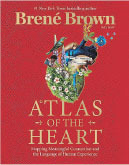An extended Reading the Bestsellers review of a 2021 book by Brené Brown
Note: Our print issue contains a shorter version of this review. Faith Today welcomes your thoughts on any of our reviews. We also welcome suggestions of other Canadian Christian books to review: Contact us.
 Book by Brené Brown. Random House, 2021. 336 pages. $35 (e-book $17, audio $38)
Book by Brené Brown. Random House, 2021. 336 pages. $35 (e-book $17, audio $38)
Shared definitions are crucial to effective communication. Just think of the word evangelical and the battles over what it means and who it applies to.
Brené Brown’s latest bestseller offers research-based definitions of 87 emotions and relational experiences, including careful distinctions between concepts like shame and guilt, empathy and sympathy.
Brown argues convincingly that more precision in how we use these ideas can help us be healthier, communicate better and resist mistreatment.
The book groups emotions into 13 chapters. For example, the chapter on hurt discusses anguish, hopelessness, despair, sadness and grief.
The chapter on good times discusses joy, happiness, calm, contentment, gratitude, joy, relief, tranquility. The good times chapter also discusses foreboding, which she argues is an emotion some of us are prone to when things are good.
The chapter on failure discusses shame, self-compassion, perfectionism, guilt, humiliation and embarrassment. The chapter on connection discusses belonging, fitting in, connection, disconnection, insecurity, invisibility and loneliness.
Likely you get the idea.
All these add up to a chatty, profound and insightful reference book. Certain sections would make great discussion starters in workplaces and other groups where people want to build deeper relationships and better communication.
The format of the book allows Brown to sum up the research she and her team have done over recent years. That’s not to say readers already familiar with her previous books should hesitate – this book is not a cheap rehash. Most references to her previously published materials are presented in newly sharpened and updated formats.
The definitions offered in this book derive their authority from thousands of annotated interviews – they’re not simply based on abstract reflection. That doesn’t mean they should all be accepted unquestioningly, and Brown herself makes clear when her proposed definitions diverge from those used by other researchers.
Brown is a research professor in social work in Texas and the author of bestselling books on courage, vulnerability, shame, belonging and empathy. Her public speaking, podcasts, TED talks and corporate consulting have made her a celebrity. (This book has a related documentary series on HBO Max.)
Brown has a strong character that comes through in the book. She’s not shy about mentioning her attendance at an Episcopal church, nor about her history with alcohol or her ongoing penchant for cursing and swearing. She’s a strong proponent for racial equality and diverse sexualities.
The last section of the book presents a “grounded theory on cultivating meaningful connection” that proposes why all these definitions are so important. Here she sums up a set of critical relationship skills such as self-confidence, curiosity, humility, empathy, compassion and trustworthiness.
Her main point is that often we can fool ourselves and others by thinking and behaving in ways that appear similar to these skills but actually are superficial imitations. The goal with the book is to help us recognize and practise these skills in ways that research shows are most healthy.
For Christians and non-Christians alike, and especially for those of us who grew up with emotional damage or limited emotional awareness, all her books offer hard-earned wisdom that can encourage individual and relational healing and growth. This book is a good summation and helpful integration of much that she and her team have contributed.
Editor's note: We love our reviewers, but we don’t always agree. You won’t either, maybe especially in the Bestsellers and Roundup sections. Do let us know what you think. Sample chapters of most books can be viewed at Books.Google.ca and Amazon.ca. Faith Today earns a small commission when people make purchases using our links to Amazon.ca.